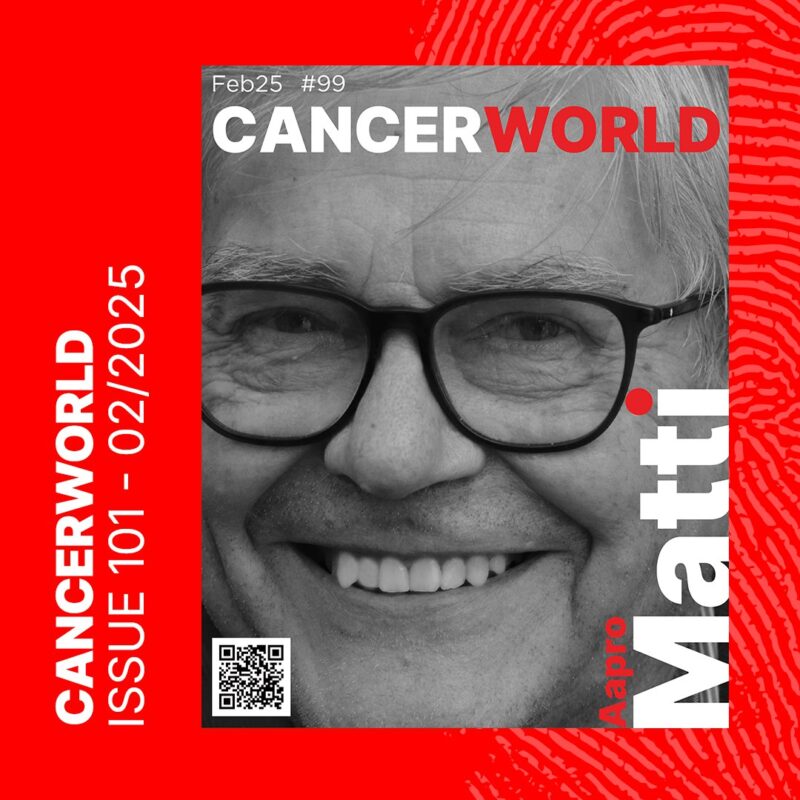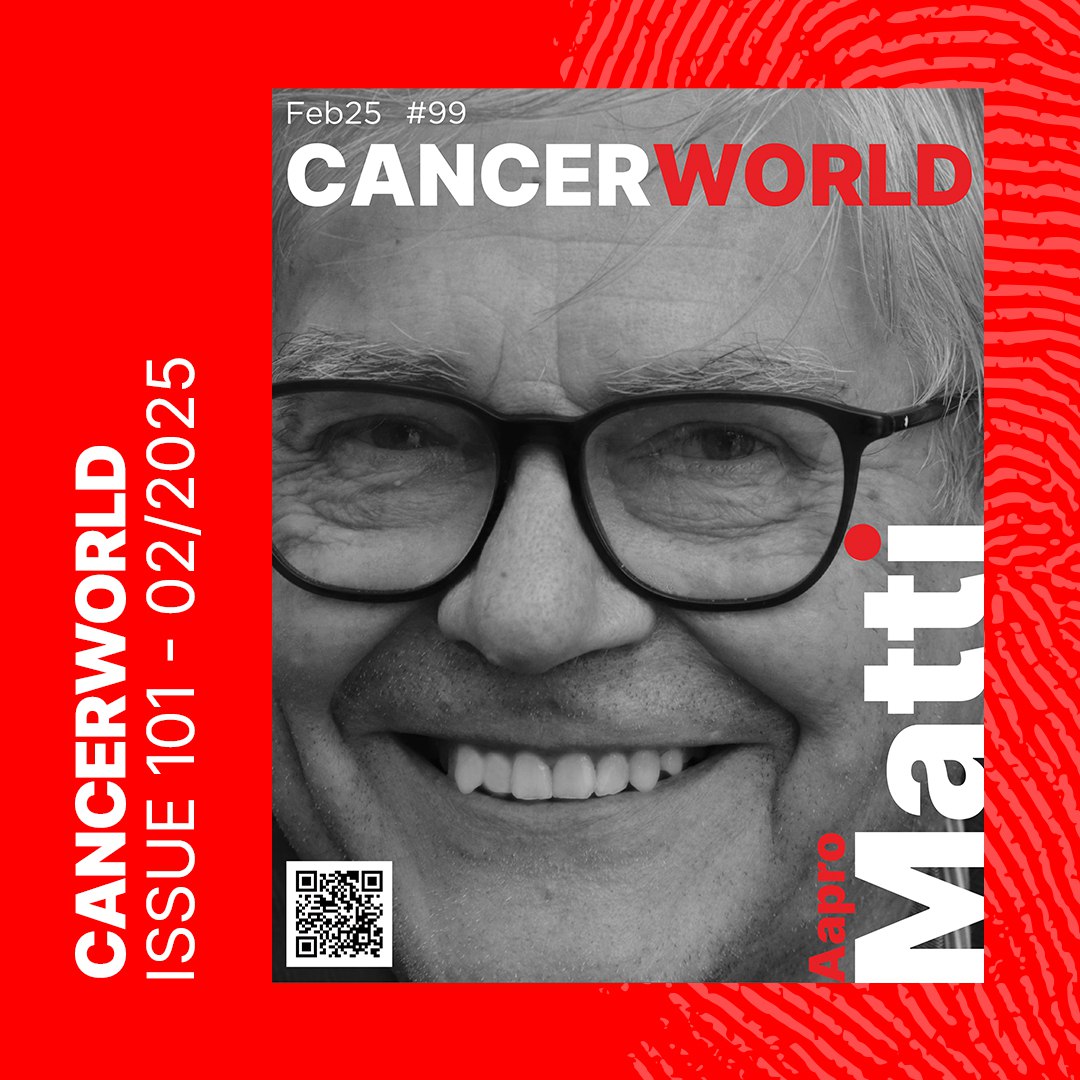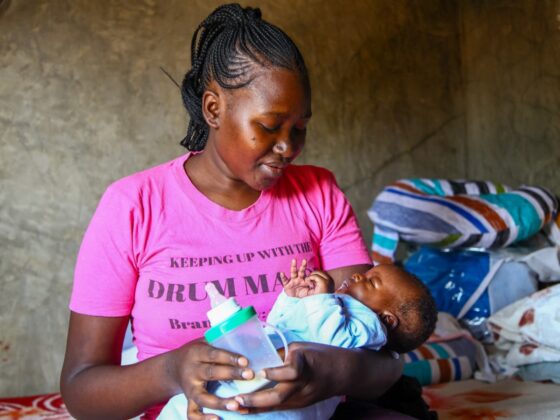If you have ever stepped into a major oncology congress, you’ve likely felt his presence before you saw him. His voice, distinct and commanding, cuts through a room not with volume, but with purpose. His laugh, genuine and disarming, puts colleagues and mentees alike at ease. His words, brimming with conviction, have shaped the course of cancer care across continents.
For decades, Dr. Matti Aapro has been at the epicenter of progress in oncology. He has advised, built, and led organizations that have transformed the landscape of supportive care, geriatric oncology, and global cancer policy. But the man behind the reputation is more than his achievements; he is a mentor, a relentless question asker, and most importantly, a doer. And at the core of it all, he is someone who believes in moving forward, always.
His journey started in the sun-drenched beaches of Rio de Janeiro, where he spent his early childhood before moving to Switzerland. A life that could have taken him into architecture, the profession he once considered, instead led him to the halls of medicine.
As he speaks, one thing becomes clear: this is not a man who merely observes history; he shapes it. From his pivotal role in the European Cancer Organization to founding international societies, his career is a testament to what happens when expertise meets unrelenting passion.
But beyond the boardrooms and conference halls, there is another side to Matti Aapro. A mentor who tells young oncologists, “Never be afraid to ask questions.” A leader who understands that progress is not a solo endeavor, but a collective mission. A grandfather who, despite a life of global commitments, still finds joy in the laughter of his grandchildren.
As we sat down for this conversation, I realized this was more than an interview. It was a masterclass in leadership, resilience, and the simple yet profound belief that the best way to change the world is to keep asking: What more can we do?
This is the story of a man who never stopped pushing forward. And in doing so, pulled an entire field along with him.
A Childhood Between Two Worlds
“Life in Brazil was the life of a rich European kid in, at that time, an easy environment,” Dr. Aapro recalls.
“Rio de Janeiro was safe. I was able to walk from our apartment building to the beach with no problem. My parents had no anxiety. My brothers and sister went to school on the bus. It was a different time.”
Unlike his siblings, who attended the American school, young Matti was enrolled in a Brazilian school.
“I enjoyed going to the beach, like any kid would. I was never good at soccer, but my friends still let me play,” he says with a smile.
Life was comfortable, privileged, even, but it was about to change drastically.
His grandfather had emigrated from Finland to Brazil and became a successful businessman. His father, who had taken over the business, struggled with health issues and ultimately made the difficult decision to move the family to Switzerland.
“Moving to Switzerland was a shock,” Dr. Aapro admits. “Coming from the freedom…”
Coming from the freedom of Rio to the strict environment of Geneva — and the terrible weather — was a huge adjustment.
“I arrived in September, and by October, I don’t think I saw the sun again,” he recalls.
Integration wasn’t easy. His parents had enrolled him in the Alliance Française in Rio to learn French before placing him in a private school in Geneva, where he soon encountered the city’s social divisions firsthand.
“The city is overwhelmed by foreigners — even Swiss from other cantons are considered ‘foreigners.’ If you’re not from Geneva, you’re not from Geneva — period.”
From Architecture to Oncology
Originally, Dr. Aapro had dreams of becoming an architect. But a visit to Brazil and conversations with renowned architects changed his mind.
“A close family friend took me to the architecture school, and I met some of the professors. When I returned to Switzerland, I spent time with a friend’s father, a prominent architect in Geneva. He explained the reality of the work — and I said, maybe not.”
His mother was a physician, though she practiced only as a volunteer. Medicine was a path he understood, even if he entered it without high expectations.
“Let’s see what happens,” he thought.
Then came a turning point — meeting Professor André Cruchaud, an immunologist looking for students to assist in his lab. Matti eagerly volunteered.
“I liked immunology,” he says. But his professor had other thoughts.
“He told me, ‘The future is in oncology.’ And then he sent me to talk to Professor Pierre Alberto.”
Dr. Aapro laughs at the memory.
“Everyone who knew Pierre, who unfortunately passed away a few years ago, succumbed to his charm. He was a wonderful person. And he said, ‘Oh, yeah, Matti, I’ll be happy to work with you.’ And that’s how I started in oncology.”
A Love Story Written in Medicine
If the story of Prof. Aapro’s career is one of serendipity and mentorship, his personal life followed a similar fate. On his first day of medical school, sitting at the back of a crowded auditorium, he saw a young woman walk through the door.
“She had blonde hair, an amazing elegance. You could tell immediately she was Italian,” he remembers. “I looked at her and thought, ‘Oh, wow.’”
But she didn’t notice him. “There were plenty of guys around her,” he laughs. “It took some time before she realized I existed. But then she did, at least because I did my homework properly.”
Their story wasn’t without twists. She became engaged to a young Italian architect, leaving Matti heartbroken.
“I was desperate. But eventually, she realized he wasn’t the right one. And then, she decided I was the lesser problem. Even today, she says every year of our marriage is a miracle.”
They married in their second year of medical school and delayed having children until they both established their careers.
“Our firstborn, Laurent, arrived after we’d been married eight years. Then Niccolo, who sadly passed away young. Then Elena. Now, we have grandchildren — Matteo, Kenji, and Anne-Sophie.”
The Evolution of Medicine Through the Eyes of a Pioneer
Matti Aapro has lived through a revolution in medicine, one that has reshaped the very foundations of oncology. Looking back, he marvels at how dramatically the landscape has transformed over the decades.
“Of course, we have accelerated the rhythm of change. There’s no doubt about that in all areas,” he says. “When I compare the medical books my mother studied in Finland to the ones I had, the difference was already striking. And today, we don’t even use medical books. Medicine has changed beyond recognition. What used to be learned from textbooks is now entirely digitized, constantly evolving with the latest advancements.”
Dr. Aapro has never been one to resist change. Instead, he embraces it, knowing that progress in oncology means lives saved. He is quick to remind us that oncology is not just about chemotherapy or targeted therapies—it is about a multifaceted approach that includes surgery, radiation and supportive care. “We must never forget that oncology is not just one field. It is surgical oncology, it is radiation oncology, and of course, it is medical oncology. All of these have changed and exploded in ways we never imagined.”
Yet, amidst all these advancements, he carries a tinge of regret for those who did not live to witness this transformation. “My first mentor, Professor André Cruchaud, once told me, ‘Forget immunology. There’s no future there.” Aapro lets out another soft laugh, one filled with nostalgia. “Unfortunately, he passed away too soon to see what immunology would become in oncology. And now, it has revolutionized everything. I often wonder what he would have thought if he had seen this era.”
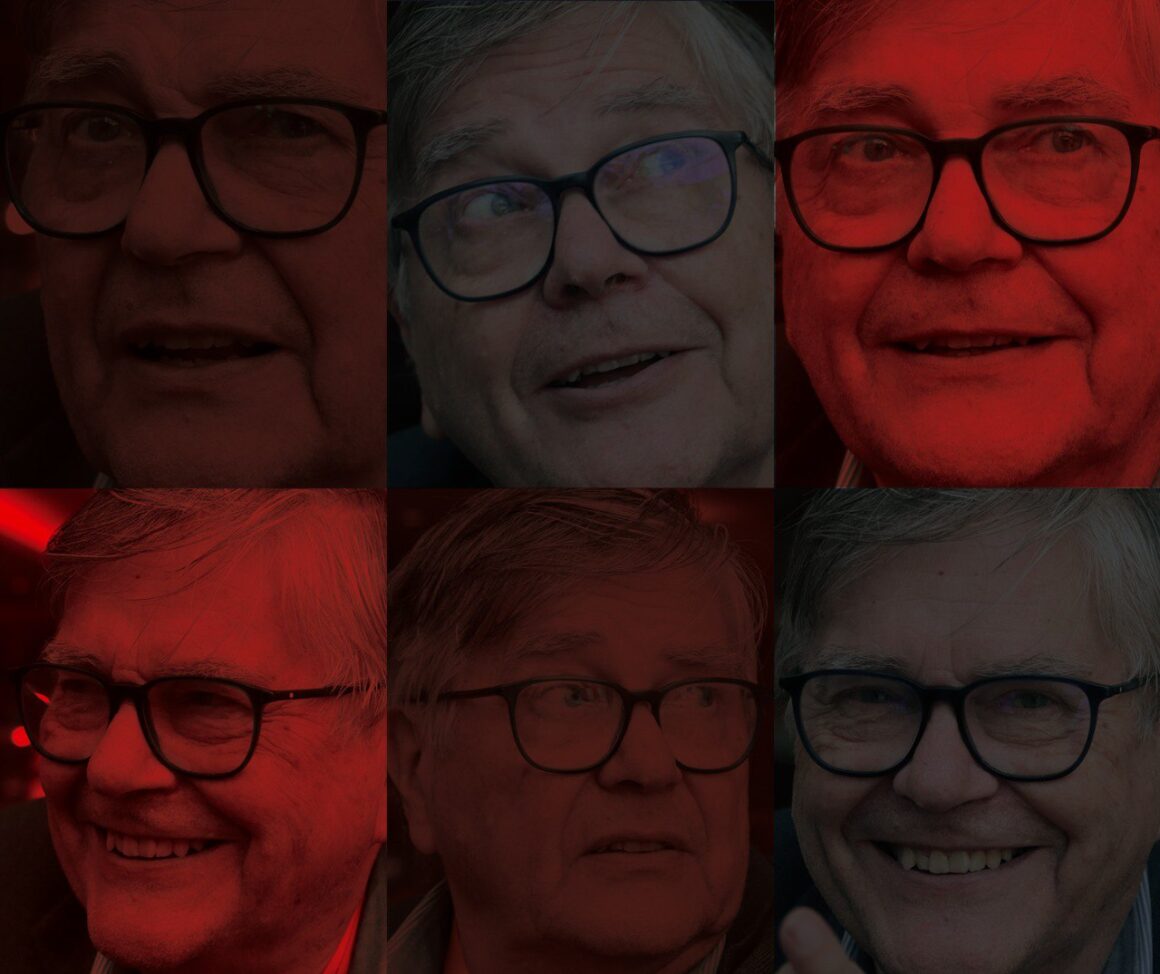
With a career spanning the full arc of modern cancer treatment, Dr. Aapro understands that progress is relentless. He has seen old paradigms collapse and new breakthroughs redefine the rules. But at the heart of it all, he remains committed to a single, unshakable belief: medicine exists to serve people. And the best doctors are not those who merely follow change but those who help drive it forward.
Matti Aapro’s journey, from Rio to Geneva, from architecture to oncology, from heartbreak to love, has been defined by moments of decision, of perseverance, and of finding joy in the unexpected.
His story is not just one of professional triumph but of the human spirit — a relentless pursuit of betterment, not just in cancer care, but in life itself.
The Most Important Lesson: Always Ask Questions
For all the accolades and accomplishments, Matti Aapro’s most enduring lesson from his career is simple: always ask questions.
“If you have a question, you ask,” he says emphatically.
“That’s something I learned from all my mentors André Cruchaud, Pierre Alberto, and from Syd Salmon, Stephen Jones and Dave Alberts when I worked in Tucson, Arizona. And later, when I had the honour of working with Umberto Veronesi and Alberto Costa in Milano”
This philosophy was ingrained in him early on, particularly during his medical training. He recalls the days when Professor Alex Müller, the head of the medical department, would conduct patient rounds. It was an event of great formality, with consultants, assistants and medical students standing in organized ranks.
“I was just a medical student,” Dr. Aapro says, smiling at the memory. “And everyone else thought, ‘Oh, the big professor. We cannot speak.’ But I didn’t care. He was just another human being. So I asked questions.”
That willingness to speak up paid off. When he later applied for an internship in the Department of Medicine, a highly competitive position, he received an unexpected call from the professor’s secretary.
“She said, ‘Professor Müller wants to see you.’ And I thought, ‘Well, here comes the rejection.’” Dr. Aapro laughs.
But instead, Müller looked at him and said, “Why didn’t you ask me directly rather than sending this application letter? Of course, you’re hired.”
That moment reinforced a lesson that has stayed with Dr. Aapro throughout his career. “You ask questions, you will learn. That is what I try to tell everyone. Don’t
be shy.”
Even now, as a globally recognized leader in oncology, he sees the same hesitation in young professionals.
“You give a talk, and no one asks questions. Then, during the coffee break, suddenly, ten people surround you, asking all the questions they were too shy to ask
in front of the room. And I tell them-why not ask it then? Others could have learned something too.”
The message is clear: learning happens in the open. Growth happens when curiosity outweighs hesitation. And for Dr. Aapro, the greatest breakthroughs have
always started with a simple question.
A Mentor to Many: Building Legacies
Throughout his career, Matti Aapro has guided countless mentees, offering wisdom, support, and opportunities. His approach to mentorship is simple but profound:
“People need help-ask for help. And then it’s a question of contact.” Some of those he mentored moved on in different directions, but others stayed, carving their own
impactful paths. “And I can tell myself,” he smiles, “he’s one of mine, and that’s a great feeling.”
His influence extends far beyond individuals. Dr. Aapro has been instrumental in establishing organizations that are now pillars of global oncology. But he is quick to deflect credit.
“It’s not me,” he insists. “You don’t do these things by yourself. You need the right people around you. If you have the right team, you can talk on their behalf. You can amplify their voices, and in return, they will amplify yours. That’s how real change
happens.”
His ability to forge strong professional relationships has been instrumental in shaping some of the most important oncology organizations in the world. When
the International Society of Geriatric Oncology (SIOG) was just an idea, it needed someone who could see beyond its immediate challenges. Dr. Aapro stepped in, insisting that geriatric oncology–an often-overlooked field-deserved a dedicated society.
“I told Lodovico Balducci, ‘Let’s stop having just meetings. Let’s create
something lasting.’ He hesitated at first. ‘It’s too complicated,’ he said. But I knew it could be done. And now, SIOG is thriving.”
This determination to turn ideas into action would become his trademark. He played a pivotal role in the Multinational Association of Supportive Care in Cancer (MASCC), an organization that fundamentally changed how cancer patients receive supportive care. He learned from its founders–Hans-Jörg Senn, Jean Klastersky, and Stephen Schimpff–absorbing their strategies and applying them to his own leadership roles.
Then came ECO (previously ECCO), the European Cancer Organization. When Dr. Aapro was asked to step in, it was at a crossroads. “ECO was in trouble,” he recalls. “People told me there was no saving it. That it was done. But my friends at the European School of Oncology, namely Prof Franco Cavalli and Dr Alberto Costa, remembering ECCO was a legacy of FECS started among others by Umberto Venoses, didn’t believe in writing off an idea that still has potential.”
He worked closely with key figures like Philip Poortmans and Mike Morrissey to redefine ECO’s purpose. They introduced new working groups, engaging the oncology community in ways that hadn’t been done before. The impact was immediate. Societies that had previously questioned ECO’s relevance suddenly saw their members actively participating in discussions that shaped European oncology policy. This sense of mentorship and responsibility isn’t confined to established institutions. It extends to the political sphere as well. His long-standing relationships with policymakers, including EU Commissioner for Health Stella Kyriakides, helped shape Europe’s Beating Cancer Plan, a groundbreaking policy initiative. When
Kyriakides took office, and she embraced Aapro in front of her entire team, saying, “I’ve known Matti for years.”
In that moment, it was clear that his work had moved beyond oncology and into the realm of shaping how cancer is tackled on a systemic level. But despite all of these achievements, Dr. Aapro remains unwavering in his belief that the most important part of his legacy is not in titles or awards- it is in the people he has brought together. “At the end of the day, the best thing you can do is connect people. Ideas
fade. Organizations change. But if you’ve built real relationships, those last forever.”
As he reflects on the many institutions he has helped shape, it’s clear that his true gift is not just leadership, it’s the ability to inspire those around him to dream bigger,
to push further, and to never stop asking, What more can we do?
A Life of Knowledge, Dedication, and Legacy
For a man who has spent his life in the pursuit of better cancer care, choosing a single book to recommend is no easy task. Matti Aapro has read countless volumes, each offering different insights into history, science, philosophy, and human nature. Yet, when pressed to name just one, his mind instinctively travels back to the roots of
civilization.
“The first book that comes to my mind,” he says after a pause, “is a book about our origins as a civilization-our occidental civilization. To understand where we are
now started a long time ago. And a lot of the complaints we hear today? They were the same complaints written 3,000 years ago by the Greeks. The kids don’t behave
at school.” He chuckles. “It was already an issue back then.”
For Matti Aapro, history is more than a collection of past events. It is a mirror that reflects our present and our future. Just as he has spent his career helping oncology evolve with time, he values the ability to see continuity in human experience, learning from the past to better shape what comes next.
Defining a Life in One Sentence
If a lifetime of work, relationships, and accomplishments could be distilled into one sentence, how would he define himself? The answer comes without hesitation.
“Matti Aapro is a person dedicated to his family, his friends, and his patients.”
Simple. Honest. At the core of everything he has built, these are the three pillars that have guided him from the beginning.
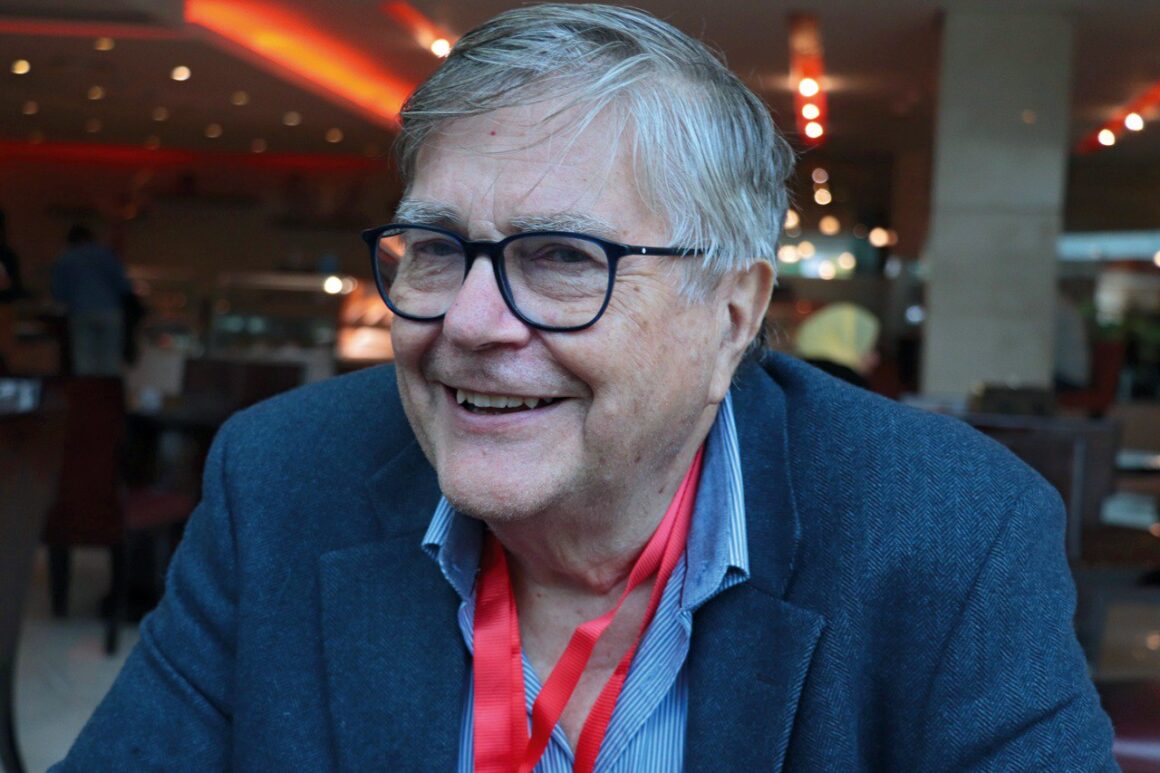
Who Comes Next?
After spending hours sharing his own journey, Aapro is posed with one final question: Who should we interview next? This, too, is a complicated question. Not because he lacks an answer, but because the list is too long. There are too many names that come to mind–people who have shaped the field, who have worked tirelessly for patients, who have revolutionized cancer care in ways big and small.
“I had the opportunity, thanks to a colleague in Russia, to make a presentation that my friends in France also asked me to do–Faces in Supportive Care. My presentation started with an apology. Because I had to choose some faces. And of course, I chose those that, for me, were the most significant. Which doesn’t mean that many others aren’t just as significant.”
He pauses, acknowledging the weight of the question. “If I name just one, I’ll have thousands of enemies and one friend.” Yet, if one person must be named, it seems only fitting that it should be Alberto Costa, the man behind CancerWorld. “I am the godfather of CancerWorld,” Aapro says, “but it is Alberto’s baby. I’ve enjoyed working with him and continuing to work with him.”
Had fate allowed, perhaps he would have named Umberto Veronesi, the pioneering Italian oncologist who changed the face of cancer surgery and prevention, but who sadly passed away in 2016. Still, there are many others–many who have made an impact, not just those whose names appear on the covers of medical journals, but those who have worked tirelessly behind the scenes, shaping the future of cancer care for generations to come.
As the conversation comes to a close, Dr. Aapro offers one final thought. “Who cares about the areas in which I’ve worked and written? Anyone can go online and retrieve my publications. That’s easy. What matters is whether any of this–the experiences, the lessons– resonates with someone. Maybe we didn’t miss anything. Maybe, after all of this, I’ll still think of things I should have said.” And with that, he leans back. A life’s work spoken, a legacy still unfolding.

